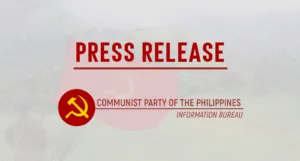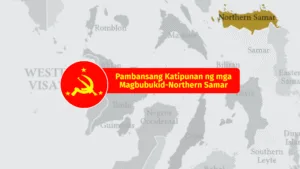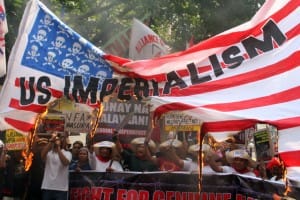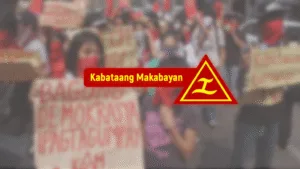By LUIS G. JALANDONI
Chairperson, NDFP Negotiating Panel
The National Democratic Front of the Philippines (NDFP) welcomes the statement of the Catholic Bishops’ Conference of the Philippines (CBCP) in condemning the extra-judicial killings of activists, which adds in particular that the Arroyo government and the military’s response to these incidents is “not too convincing.”
By LUIS G. JALANDONI
Chairperson, NDFP Negotiating Panel
The National Democratic Front of the Philippines (NDFP) welcomes the statement of the Catholic Bishops’ Conference of the Philippines (CBCP) in condemning the extra-judicial killings of activists, which adds in particular that the Arroyo government and the military’s response to these incidents is “not too convincing.”
However, the CBCP statement signed by its President, Archbishop Angel N. Lagdameo, D.D., on January 28, 2007 is tame in comparison to the positions of concern taken by many other Church organizations as well as human rights institutions from the Philippines and abroad. Alarmed by the unabated killings and involuntary disappearances of suspected Leftists, their expressions of concern have pointed to the government security forces as the perpetrators of the extra-judicial killings and involuntary disappearances as they criticized also the investigation bodies formed by Ms. Gloria M. Arroyo as either a failure or as intended to cover up the responsibility of the state security forces.
We take exception to the CBCP statement pointing to the extra-judicial killing of farmers as also perpetrated by “leftist” groups and by the New People’s Army when their only “crime” to quote the statement, “is their inability to pay the ‘revolutionary tax’ demanded of them by the NPA.” We ask the CBCP to take prudence instead of saying that “leftist groups” are also behind the killings considering that this is the same line mouthed by the regime’s psywar and disinformation agencies. The Catholic leadership may fall into the trap of being used by the perpetrators themselves.
We would like to emphasize that the NPA, whose main force is the peasantry long subjected to feudal exploitation and oppression, does not exact “revolutionary tax” from the peasants much less “kill” them for failure to obey. Since its founding, the NPA has been in the frontline of launching agrarian revolution in the countryside, in particular, carrying out the reduction if not elimination of big landlord usury and, in areas where conditions are ripe, undertaking forms of land distribution. NPA cadres and members have continuously carried out literacy and medical campaigns especially in areas where the masses have not seen any form of government service for decades.
The NPA has scored great successes in addressing the peasants’ basic problems and in empowering the poor toward social and economic restructuring. But perversely, the U.S.-backed Arroyo regime has reacted by stepping up militarization in the countryside leading to the gross and systematic violations of human rights and flaunting the regime’s sham Comprehensive Agrarian Reform Program (CARP) which the Filipino peasantry has long ago rejected.
Despite the reactionary regime’s relentless campaigns against the NPA and its alleged front organizations’ leaders and members, the NPA has expanded to more than 120 guerrilla fronts all over the Philippines. The all-out support extended by the Filipino peasants in many provinces where the NPA operates and their readiness to join the people’s Red Army anytime and anywhere, only show that the armed revolutionary underground does not need to engage in imposing “revolutionary tax” the way all reactionary governments, past and present, exact billions of pesos in taxes from the Filipino people that in the end are pocketed by corrupt politicians and bureaucrats resulting in the greater impoverishment of the masses.
It is advisable that the CBCP take into account this reality. We wish to issue a strong call for the bishops to match their words with action with regard to the CBCP call for the implementation of a better CARP by not waiting for any illusory response by the Arroyo regime but by immediately extending effective support to the Filipino peasantry’s collective struggles in the countryside for genuine agrarian reform and their urgent demand – as endorsed by many Church organizations in the Philippines and abroad – to end the Arroyo regime’s militarization of the countryside.









